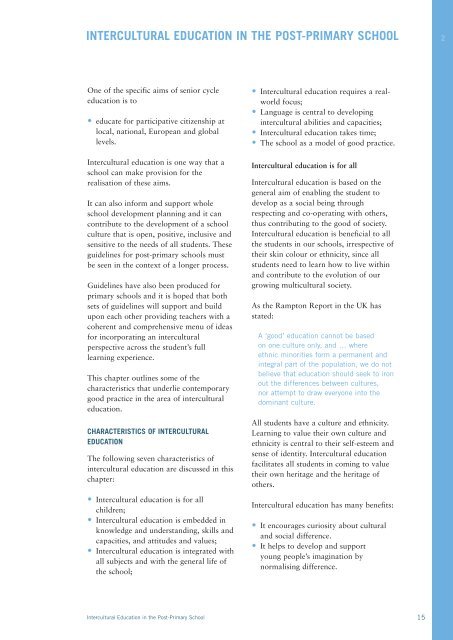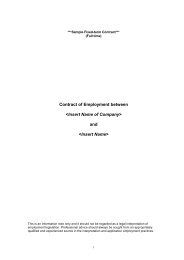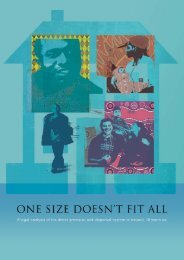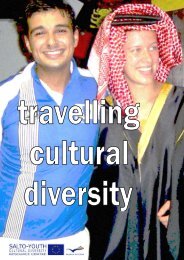Intercultural Education in the Post-Primary School - National Council ...
Intercultural Education in the Post-Primary School - National Council ...
Intercultural Education in the Post-Primary School - National Council ...
You also want an ePaper? Increase the reach of your titles
YUMPU automatically turns print PDFs into web optimized ePapers that Google loves.
INTERCULTURAL EDUCATION IN THE POST-PRIMARY SCHOOL 2One of <strong>the</strong> specific aims of senior cycleeducation is to• educate for participative citizenship atlocal, national, European and globallevels.<strong>Intercultural</strong> education is one way that aschool can make provision for <strong>the</strong>realisation of <strong>the</strong>se aims.It can also <strong>in</strong>form and support wholeschool development plann<strong>in</strong>g and it cancontribute to <strong>the</strong> development of a schoolculture that is open, positive, <strong>in</strong>clusive andsensitive to <strong>the</strong> needs of all students. Theseguidel<strong>in</strong>es for post-primary schools mustbe seen <strong>in</strong> <strong>the</strong> context of a longer process.Guidel<strong>in</strong>es have also been produced forprimary schools and it is hoped that bothsets of guidel<strong>in</strong>es will support and buildupon each o<strong>the</strong>r provid<strong>in</strong>g teachers with acoherent and comprehensive menu of ideasfor <strong>in</strong>corporat<strong>in</strong>g an <strong>in</strong>terculturalperspective across <strong>the</strong> student’s fulllearn<strong>in</strong>g experience.This chapter outl<strong>in</strong>es some of <strong>the</strong>characteristics that underlie contemporarygood practice <strong>in</strong> <strong>the</strong> area of <strong>in</strong>terculturaleducation.CHARACTERISTICS OF INTERCULTURALEDUCATIONThe follow<strong>in</strong>g seven characteristics of<strong>in</strong>tercultural education are discussed <strong>in</strong> thischapter:• <strong>Intercultural</strong> education is for allchildren;• <strong>Intercultural</strong> education is embedded <strong>in</strong>knowledge and understand<strong>in</strong>g, skills andcapacities, and attitudes and values;• <strong>Intercultural</strong> education is <strong>in</strong>tegrated withall subjects and with <strong>the</strong> general life of<strong>the</strong> school;• <strong>Intercultural</strong> education requires a realworldfocus;• Language is central to develop<strong>in</strong>g<strong>in</strong>tercultural abilities and capacities;• <strong>Intercultural</strong> education takes time;• The school as a model of good practice.<strong>Intercultural</strong> education is for all<strong>Intercultural</strong> education is based on <strong>the</strong>general aim of enabl<strong>in</strong>g <strong>the</strong> student todevelop as a social be<strong>in</strong>g throughrespect<strong>in</strong>g and co-operat<strong>in</strong>g with o<strong>the</strong>rs,thus contribut<strong>in</strong>g to <strong>the</strong> good of society.<strong>Intercultural</strong> education is beneficial to all<strong>the</strong> students <strong>in</strong> our schools, irrespective of<strong>the</strong>ir sk<strong>in</strong> colour or ethnicity, s<strong>in</strong>ce allstudents need to learn how to live with<strong>in</strong>and contribute to <strong>the</strong> evolution of ourgrow<strong>in</strong>g multicultural society.As <strong>the</strong> Rampton Report <strong>in</strong> <strong>the</strong> UK hasstated:A ‘good’ education cannot be basedon one culture only, and … whereethnic m<strong>in</strong>orities form a permanent and<strong>in</strong>tegral part of <strong>the</strong> population, we do notbelieve that education should seek to ironout <strong>the</strong> differences between cultures,nor attempt to draw everyone <strong>in</strong>to <strong>the</strong>dom<strong>in</strong>ant culture.All students have a culture and ethnicity.Learn<strong>in</strong>g to value <strong>the</strong>ir own culture andethnicity is central to <strong>the</strong>ir self-esteem andsense of identity. <strong>Intercultural</strong> educationfacilitates all students <strong>in</strong> com<strong>in</strong>g to value<strong>the</strong>ir own heritage and <strong>the</strong> heritage ofo<strong>the</strong>rs.<strong>Intercultural</strong> education has many benefits:• It encourages curiosity about culturaland social difference.• It helps to develop and supportyoung people’s imag<strong>in</strong>ation bynormalis<strong>in</strong>g difference.<strong>Intercultural</strong> <strong>Education</strong> <strong>in</strong> <strong>the</strong> <strong>Post</strong>-<strong>Primary</strong> <strong>School</strong> 15
















